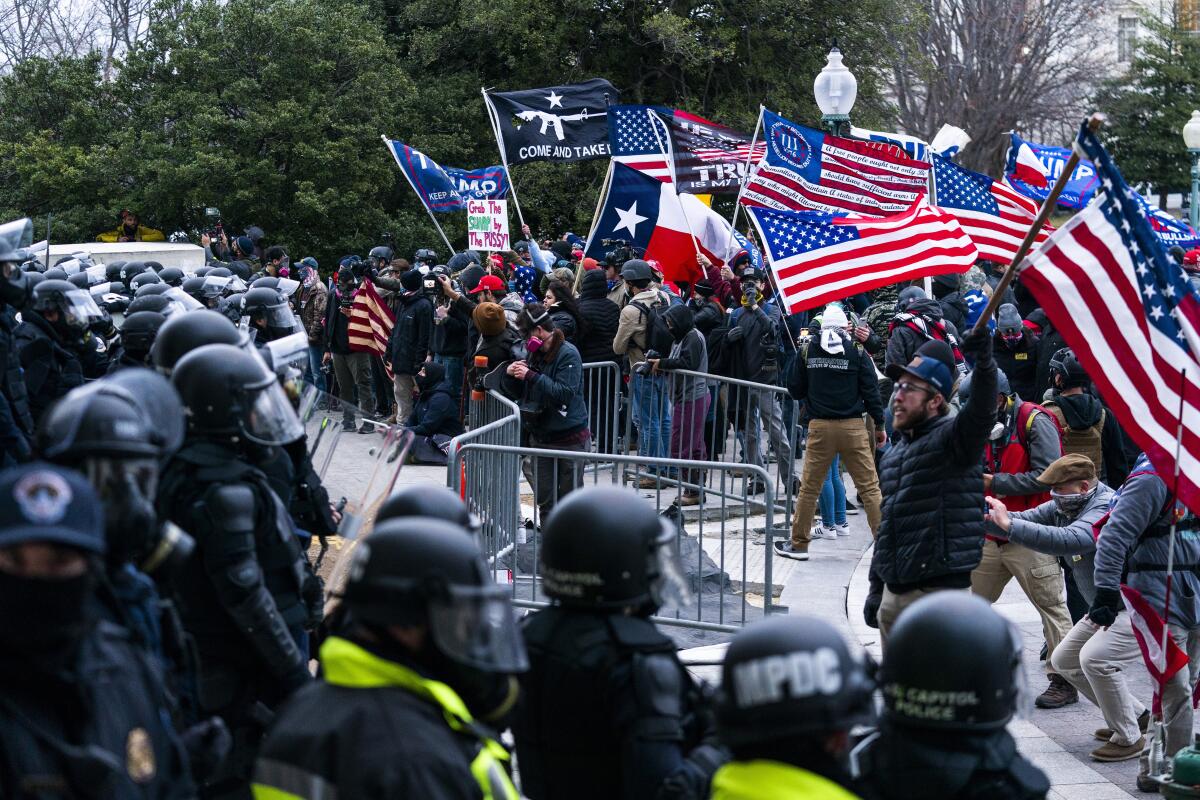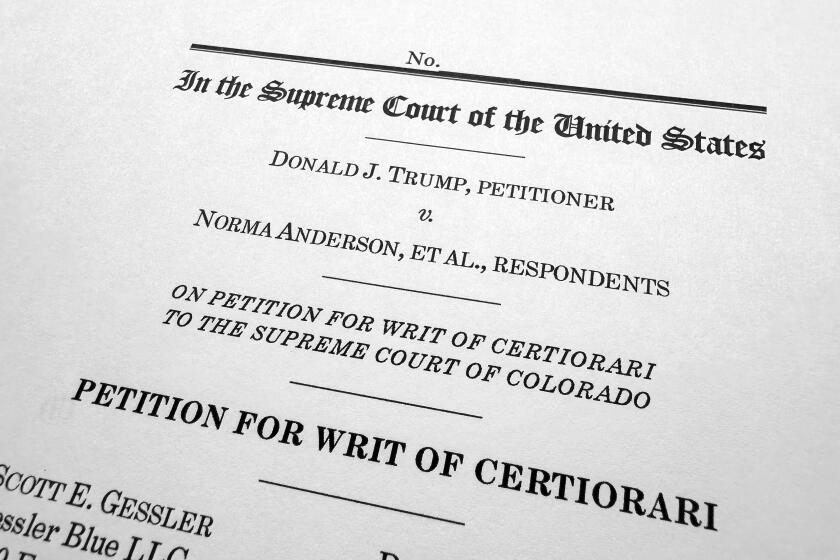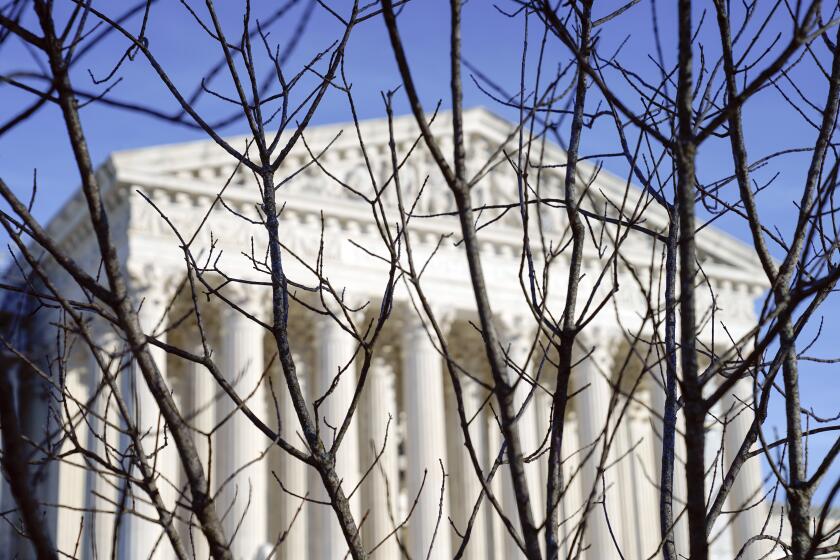Column: Disqualify Trump? The Supreme Court is getting lots of urgent advice — but no clear direction

- Share via
The magnitude of the Supreme Court’s coming decision on whether Donald Trump should be disqualified from the presidential ballot can be measured in pounds — namely, the weight of the quickly growing pile of friend-of-the-court briefs that an array of outside groups and individuals have submitted to the court.
Trump’s lawyers filed their main arguments against the Colorado Supreme Court ruling disqualifying him for insurrection under the 14th Amendment a week ago, and more than 30 amicus briefs were filed that day. That brought the total to about 40, a number that is certain to grow.
The briefs themselves are divided among those that support the Colorado ruling, those that support Trump’s appeal and those that advance principles to guide the decision without coming down on either side. While some are from relatively obscure quarters, many come from prominent players whom the justices (and the clerks who sift through the briefs) will readily recognize.
What’s really striking about the briefs is that they all scream that the sky is falling and that disaster will ensue unless the court does as they advise. The trouble is that the advice in question is all over the lot.
The former president’s disqualification for insurrection under the 14th Amendment in Colorado threatens to make a mess the justices will likely try to avoid.
Effectively, the court is being advised by its respectable “friends” (the meaning of “amicus”) that the Republic itself is lost no matter what it does. The briefs underscore the impression that this will be a case for the ages and one of the toughest in the court’s history.
One brief from prominent election law professors and practitioners, including veterans of both sides of Bush vs. Gore, advises the court that the country is more polarized now than at any time in living memory — far more than in 2000 — and that the court must rule on the substance of the case or risk doing great damage to the nation. In other words, they argue, the court must not cop out by ruling that some other political entity — either Congress or the states — must enforce Section 3 of the 14th Amendment, which prohibits officials who have engaged in insurrection from holding federal office.
A brief from 179 members of Congress — including Senate Minority Leader Mitch McConnell and other prominent Republicans — agrees that a wrong move by the court “presents a serious risk to the democratic process.” But they go on to counsel that it’s Congress that has the express authority to administer Section 3 through legislation and that the court can’t answer the political questions involved. Accepting these rationales would mean that the court dodges the question of Trump’s eligibility for the presidency.
The justices may want to reverse the Colorado decision disqualifying the former president for insurrection under the 14th Amendment, but it won’t be easy.
The NAACP’s brief, meanwhile, agrees that “our nation is at a precipice not seen since the Civil War.” Yet it argues, in direct opposition to the legislators, that Section 3 is self-implementing and fully justiciable — that is, it requires no determination by Congress and can be decided by the court. Indeed, the group insists that a failure to disqualify Trump would “circumvent our constitutional commitment to … the principle that all citizens must have an equal voice in our government.”
Former Attys. Gen. Edwin Meese, Michael Mukasey and William Barr, joined by prominent conservative professors, agree on the stakes: A false step by the court “would be ruinous for the Nation’s tradition of free and fair elections.” But their advice to the court is an admixture of the other briefs’ bottom lines: They argue that the amendment requires enabling legislation but also that it does not cover presidential candidates.
There are many more, including an intriguing brief by law professors (and brothers) Akhil Reed Amar and Vikram David Amar advising the court that Section 3 was prompted not by the Civil War but by a previous insurrection that Trump’s conduct much resembles. And a forthcoming brief by retired federal appellate Judge J. Michael Luttig and others is expected to contend that the terms of the 14th Amendment straightforwardly disqualify Trump.
Amicus briefs can occasionally be decisive. A famous example is the brief from an editorial cartoonists’ group that helped persuade Chief Justice William Rehnquist to side with Hustler magazine over televangelist Jerry Falwell. It emphasized the long-standing national tradition of cartoons savaging public figures.
As I’ve previously argued, more than any Supreme Court case in decades, this one combines huge political stakes with a nearly blank slate of controlling law. The court will have to search for a solution that is legally supportable, broadly acceptable to the public and minimally injurious to the court’s diminished public standing. That turns out to be a very tall order.
With all eyes on the justices and the health of our democracy very possibly in the balance, the court could certainly use a good friend right about now.
Harry Litman is the host of the “Talking Feds” podcast. @harrylitman
More to Read
A cure for the common opinion
Get thought-provoking perspectives with our weekly newsletter.
You may occasionally receive promotional content from the Los Angeles Times.













